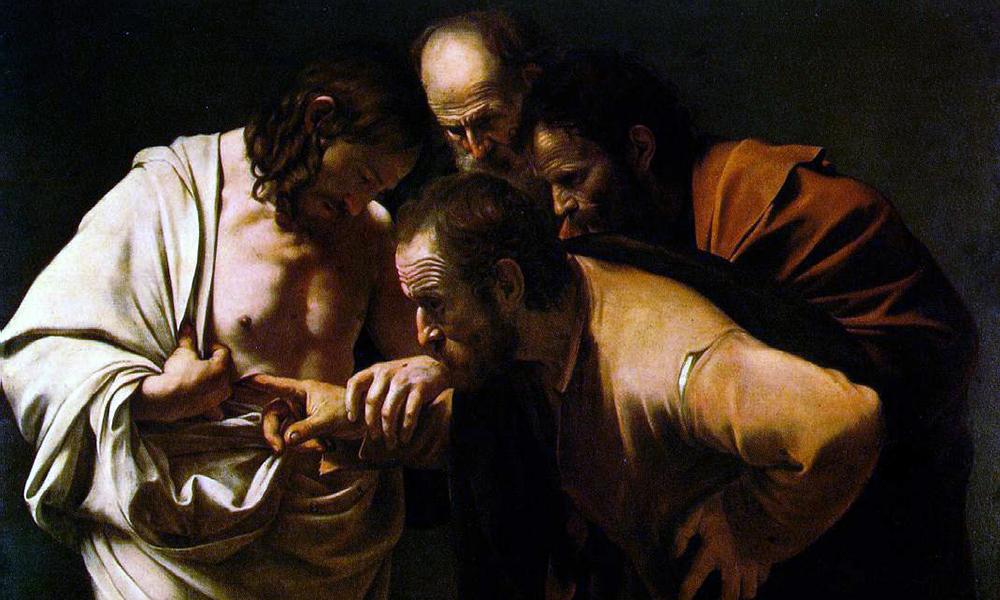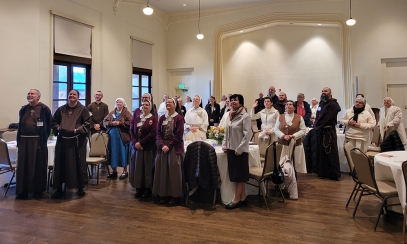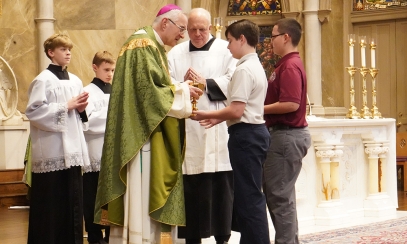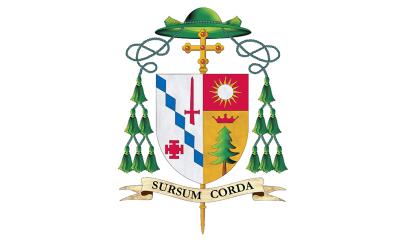
‘My Lord and My God!’
Bishop Raica Celebrates the Second Sunday of Easter
Bishop Raica Celebrates the Second Sunday of Easter
On April 24, Bishop Raica celebrated Mass at the Cathedral of St. Paul, marking the Second Sunday of Easter. The complete text of his homily follows herein.
On April 24, Bishop Raica celebrated Mass at the Cathedral of St. Paul, marking the Second Sunday of Easter. The complete text of his homily follows herein.
My friends, growing up, it was not uncommon for us to have nicknames. Many of my classmates and neighbors did. Typically, the name had some association with a trait or a character of the person it was attached to. It was an aspect of familiarity and friendliness. At the time, I don’t ever remember using a nickname to denigrate or disparage anyone’s dignity. It’s interesting, isn’t it, that some of the Apostles had nicknames too. Peter was referred to as “Rock.” Andrew was “the fisherman.” James and John were the “sons of thunder”- I wonder what that said about their personalities! Judas – only afterward and in hindsight – became known as “the traitor” or “the betrayer,” pointing out a factual event. Today, we find ourselves confronted with one of the more interesting figures because he represents so many of us: Thomas, who became known as “doubting Thomas” or Thomas the doubter. He’s the one I’d like to focus on today.
So, here’s the crux: Thomas wanted positive, explicit, and verifiable proof – much akin to utilizing the scientific method – that Jesus had Risen / was Risen from the dead. He wouldn’t believe the others who had literally seen Him. Even though He was identified among the apostles, who lived and walked with Jesus, he would not believe the witness testimony given by those who encountered the Risen Christ. To be sure, it didn’t fit reality as he knew it. So much of what we do today wants verifiable results, so we can positively rely on the claims that are made. We can see the confusion that we’ve experienced over the past few years with the COVID experience over what is scientifically true or not. Seeing and hearing provide for us a verification that enables us to give certainty to these claims for ourselves. For that reason, the scientific method is something of a sure guide to ensure objectivity and the truth of the object in question, but it is not the only way that the truth of a situation can be verified.
Thomas, it appears, would fit well into a culture that wants to advance the scientific certitude of every claim. So, when the others told him, “We have seen the Lord,” Thomas’ instinct jumps right in, “I won’t believe it until ‘I’ see and touch the nail marks and the wound in His side.” The nail marks and the wounds on a figure would be the signal characteristics that would need to be examined for him to believe.
However, the testimony of witnesses about a fact can also lead to the verification of a fact. We don’t always have to see it or verify it personally. We assume the truth of claims that are made if the witnesses are more than reasonably credible. We build in guidelines and laws of evidence to prevent fraud or misrepresentation or perjury.
Think about it! If we didn’t have trust in witnesses, our civil society would grind to a halt. How would we eat any food if we always had to have every item tested to see if it is poisonous or not? How would we get into a plane if we did not verify every time the skills and certification of the pilot? How would we drink the water unless we had every cup tested? How would we believe that some micro-organisms cause diseases unless we ran and verified the experiments for ourselves. It would be absolutely absurd. Our culture, society, economy, and commerce would grind to a halt if everything could not be trusted.
This trust, in the testimony or witness of another, is what we can refer to as “faith.”
It is also the fact that the whole purpose of faith is to acknowledge the amazing presence of Christ in the same way as the first witnesses did because of what we see, what we hear, what the Christian people have experienced. For this reason, our Lord’s presence can be verified not as merely an historical fact, but in the remarkable way that the people who claim Him as their own in their lives.
These observations were already noticed in the first reading when St. Luke notices, “They (the early Christian community) devoted themselves to the teaching of the apostles and to the communal life, to the breaking of bread and to the prayers. … They devoted themselves to meeting together in the temple area and to breaking bread in their homes.” In other words, those who have encountered and met Christ live not like everyone else. They live in a new and different way that demonstrates something so awesome and remarkable that their whole life focus has changed. “Awe came upon everyone.”
Today, those facts have not changed. Testimony of witnesses continues to give rise to the presence of Christ present and active today. Christ comes to Thomas in his imperfection – not because he was religiously perfect. There’s hope for us because of the witness of Thomas, or the humble publican in the back of the temple saying, “Be merciful to me, a sinner!” He’s the one who went home justified. Or the Good Thief, who begs the Lord, “Remember me when You come into Your kingdom.” And many more! They are the witnesses to God’s mercy! Here’s a consideration for today:
Today is Divine Mercy Sunday. Sister Faustina of Kraków shared her experience of the profound mercy of God that was needed at that time and is so needed today. It is a mercy that is more than just being kind to each other. At its deepest level it illustrates that good is stronger than evil; God’s love is stronger than hate; God’s “yes” is stronger to our “no’s”; God’s mercy is much more powerful than our sin or objections. We live at a time when retribution and revenge are seen as ways to remedy deep personal hurts, yet when we offend God so much, God’s abundant mercy comes to us instead of revenge. It comes at a time when we need it most in our lives so that we can experience the new life, this new direction promised by the resurrection.
Yes, this Sunday, when mercy and hope is needed, especially in our relationships or between nations, especially in Ukraine, we devote ourselves in gratitude to those who witness what Christ can do and is doing. We don’t have to settle for the things that reduce our humanity or that limit us to our weaknesses, our addictions, our frailties, our illnesses or even our doubts. The early Christians knew this: “See how they love one another!” non-believers noted. It is not just a nice thought of the past, but something that can impact us today. Throw open the windows to let in the gentle breeze of mercy, and do not be afraid to follow the path that Christ has laid out. He has called us to a greatness that no one can take away. Those who are baptized have “put on Christ” and live a life of abundance of hope and joy that no one can take away. May we no longer persist in our doubt of the goodness and mercy that the Lord has given us, and may we remain in a posture of awe of God’s presence among us as we echo the words of Thomas who is our credible witness. Thomas the doubter became Thomas the believer because he experienced first-hand, for all of us, God’s mercy and embrace. He gives us his faith witness upon seeing the Risen Christ: My Lord and my God! We echo it today, “My Lord and my God!”



